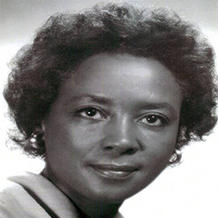In 1976, February was designated as Black History Month. Here are three notable pioneers in computer science history.
Annie Easley

Annie Easley was one of the first African Americans to work for the National Aeronautics and Space Administration (NASA). Her work at NASA led to numerous scientific contributions, and significant advances in the administration's outreach programs. It broke down barriers for women and people of color in STEM fields. Easley was encouraged to lead by reading an article about twin sisters at Cleveland, Ohio's Aircraft Engine Research Laboratory, whose mathematical work established them as "human computers." In 1955, Easley began her career by performing similar "human computer" work that involved complex computations for researchers. When computers began taking over much of this work, Easley learned to code, using languages like the Formula Translating System (Fortran) and Simple Object Access Protocol (SOAP). Her coding efforts enhanced applications that research energy conversion systems, alternative power, battery technology, and the upper stages of the Centaur rocket.
Clarence Skip Ellis

Clarence "Skip" Ellis' interest in computers was initially piqued as a teenager in Chicago, Illinois, working as an insurance company's security guard. His inspiration to learn more came when the company purchased upgraded computer equipment. He read manuals and became a power user. Throughout his college coursework and career, Ellis immersed himself in computing whenever the opportunity was presented. But, it was his work at the Palo Alto Research Center (PARC) that became his defining moment. His team developed OfficeTalk, a system that used an Ethernet connection and allowed people to work together from a distance, essentially setting the stage for collaborative document editing and remote work. Ellis held several teaching positions at Stanford University, the University of Texas, and MIT, and became the first African American to earn a Ph.D. in computer science.
Jerry Lawson

If you were an engineer in 1970s Silicon Valley, you may have sought out Jerry Lawson for semi-conductor chips. Considered by some as the “Father of Modern Gaming,” Lawson was an engineer and designer that helped develop Fairchild Channel F, an early cartridge-based gaming console. Lawson was a self-taught engineer who grew up in Queens, New York, experimenting with electronics and creating an amateur radio station by the age of 13 When he arrived at semi-conductor company Fairchild, he was one of the few Black men in the industry. Lawson became a member of the Homebrew Computer Club, a meetup made famous by Steve Jobs and Steve Wozniak. Later in life, Lawson became a mentor to engineering students at Stanford. In 2019, he posthumously received the ID@Xbox Gaming Heroes Award at the Game Developer's Choice Awards.